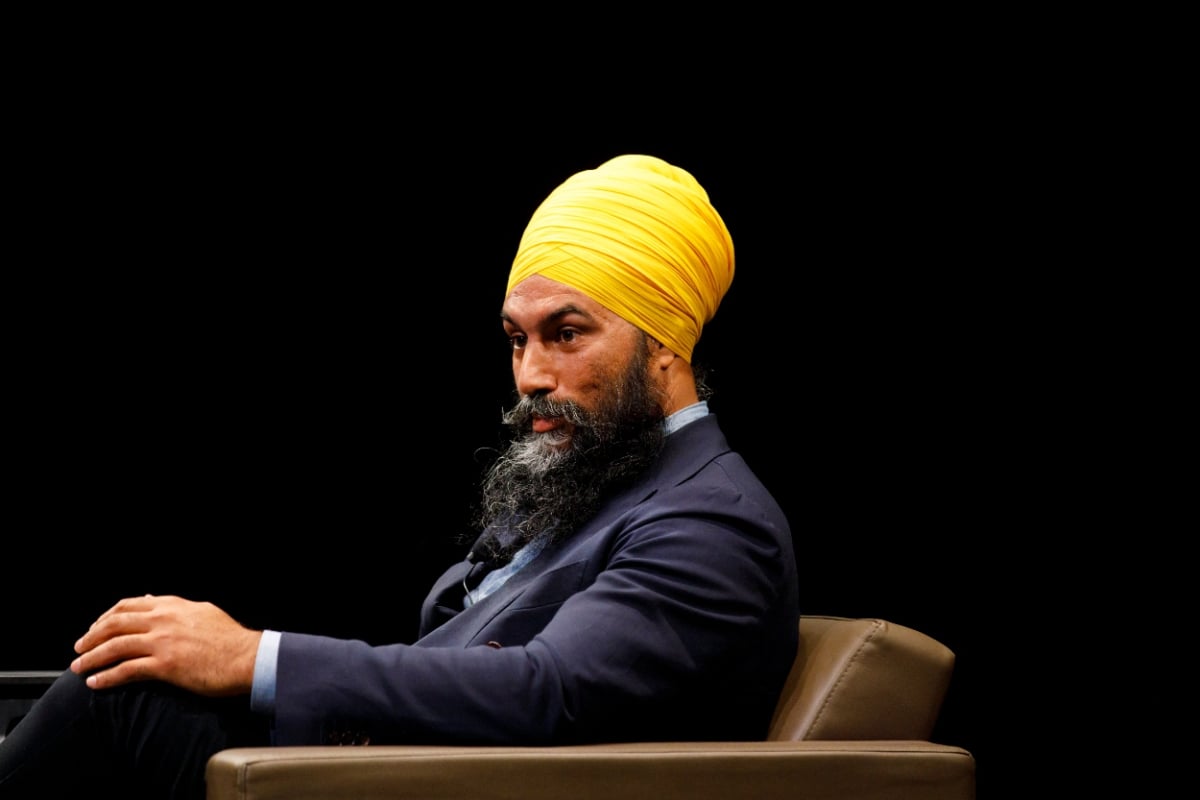Support strong Canadian climate journalism for 2025
On the last day of the NDP caucus retreat, leader Jagmeet Singh took swipes at the climate records of his top opponents, setting the stage for an intense battle over climate policy as politicians return to the House of Commons next week.
Speaking to reporters in Montreal on Thursday, Singh criticized both the Liberals and the Conservatives over their strategies to address climate change. He accused Conservative Party Leader Pierre Poilievre of wanting to give big polluters free rein to poison the water, air and land. Meanwhile, Prime Minister Justin Trudeau’s Liberals are playing politics, pitting workers against each other by offering “advantages” to Atlantic Canada not enjoyed by other regions, he said, referring to last year’s decision to pause the carbon price on home heating oil.
"We want to see an approach to fighting the climate crisis where it doesn't put the burden on the backs of working people, where big polluters have to pay their fair share," Singh said. "And so we've been working on a plan, and we'll be releasing our plan, our vision for how we can do that in a stronger way, in the coming months."
Singh did not say if the NDP’s plans will include a carbon price, as its 2021 platform did, but emphasized that he believed the burden of paying for climate action should rest with big polluters rather than regular Canadians. Despite the vague statement, some media outlets took this as a signal that the NDP will oppose the carbon tax.
An NDP staff member speaking to Canada’s National Observer said those suppositions are “inaccurate,” and that Singh wasn’t implying anything. Nonetheless, Singh’s comments confirm that not only is the supply and confidence agreement firmly in the rearview mirror, he intends to put some distance between the NDP and Liberals as politicians return to the hill.
Environment and Climate Change Minister Steven Guilbeault was quick to call out the NDP for softening its stance on carbon pricing.
“True leadership is often shown when the going gets tough,” said Guilbeault on social media following Singh’s comments, calling it “disappointing” to see the NDP “cave to Pierre Poilievre and the Conservatives misinformation and disinformation campaign on carbon pricing.”
Poilievre continues to beat the carbon tax drum, announcing this week he intends to introduce a non-confidence vote to trigger a “carbon tax election” at his earliest opportunity.
“My message to Singh and the NDP is ‘put up or shut up,’ either commit today to supporting a non-confidence motion or admit he has sold out again,” Poilievre said Wednesday.
Caroline Brouillette, executive director of Climate Action Network Canada, told Canada’s National Observer that it’s good to hear the NDP wants to make big polluters pay their fair share, but said until the party puts forward a climate plan, it’s not helpful to “sow confusion” or “scapegoat carbon pricing.”
“I think the question for the NDP here is: does it want to compete on Pierre Poilievre's terrain on who is the most stoked about axing the tax?” she said. “Or does it want to create its own alternative playing field, laying the blame where it belongs, and going after the real culprits — the oil and gas companies who are causing price hikes [and] making record profits while burning our country down?”
The federal carbon price has two primary dimensions.
First, there is the consumer-facing fuel charge (commonly called the carbon tax) which includes a tax on each tonne of carbon pollution that increases each year. The tax increases to make greenhouse gas intensive products steadily more expensive to incentivize cleaner investments (like switching from a gas furnace to a high efficiency heat pump). The federal government rebates money collected through the tax back to most Canadians.
Economic analyses indicate about 80 per cent of Canadians receive more money back in rebates than they pay in taxes. A family of four in provinces that have the federal carbon price in place receive quarterly payments of $190 to $450, on average, depending on the province.
Then there is an industrial carbon price, where large emitting companies pay a tax for each tonne of carbon above a certain threshold to incentivize long term investments in decarbonization. Companies that emit below the threshold are granted credits they can then sell.
The industrial price is the federal government’s emissions reduction workhorse. The consumer carbon price is expected to drive between 8 and 9 per cent of emission reductions by 2030, while the industrial carbon price is expected to be responsible for 23 to 39 per cent of emission reductions by 2030, according to the Canadian Climate Institute.
Speaking to Canada’s National Observer on the condition of anonymity, an NDP MP said the party is not yet ready to discuss the carbon price publicly, but is weighing its options. According to the source, the party recognizes that Conservatives have effectively misrepresented the policy to Canadians, and turned people against it. The source also said the Liberals have struggled to try to explain to the public how a tax they pay somehow gives them more money back while also solving the climate problem.
“Economists love it because in a vacuum, and on paper, it looks to them like the most efficient way to reduce emissions, but when you expose it to the harsh realities of populist politics it has a pretty tough run,” the source said, adding that the industrial carbon price is more important.
“The understanding of climate policy today is very different than it was ten years ago, and so we're looking to put forward an offering that maximizes the mutual benefits of climate action and affordability, and makes people's lives better,” they added.






Comments
The conservative & NDP groupies may want to axe the tax, but once that happens will complain they are now paying more in the long run. These folks just can't see the forest for the trees, nor grasp how the carbon measure work and the benefit to their pocketbook. Either way I don't care if they axe the tax or not, the low income will pay the price, while the well off will benefit, go figure.
A leader of principle and intelligence would get up on his hind legs and defend the program (not tax) because it s right and hits the rich, not the rest of us, but oh no not Singh.
Leading from behind the cons? Still think that s going to work for you?
Much more nuanced and informative than Max Fawcett's take on the same subject. And much less one-sided. (The one side being Max's.)
The cons have sold the big lie. it has taken a decade and a half to "have effectively misrepresented the policy to Canadians" I don't have to be polite, a lie is still a lie no matter how effectively marketed. With 10 years of actual numbers, still no nice graph showing the burden on the public despite pop tart marketing claims.
The best move for Singh is to block any attempt at a non confidence and let the effect of the 100 mil PP has spent in the last three years dissipate. The right wing wave if not peaked is close to it and PP needs to use it now or he will be replaced.
Singh is going to soak up some of their seats either way, better to take the time to put some workable ideas out there before the bread and circus routine.
My biggest fear at this point is that PP will get the election then dupe an already confused public, using the 300 polls they added, to convince them not to bother voting because the polls say he already won.
Just take yer lickin' and learn yer lesson:
You do NOT give people money except as a big novelty cheque they cannot miss. It was more efficient to just quietly deposit it, but you then got zero credit and it was just this tax, taking their money.
The heavy climate lifting in this country will not be accomplished by internal political policy but by lowering demand for fossil fuels mainly on Canada's exports. That much is very clear now that we've had years and years of climate fighting talk while emissions continue to grow, pumped up with subsidies from the very same talking heads.
Unless there is a radical change in global energy trends, solar will continue to be the cheapest form of made energy ever invented, with wind coming close behind. Their collective fossil demand destruction in China and Europe, and evolving in SE Asia and Australia, will have more sway to decarbonise than any lofty promise either for or against electrification made by any Canadian politician.
Progress on climate in Canada is a non starter because both corporate and union donors to political parties and consumers in general won't have it if it means too much "uncomfortable" change.
However, examples of entire Australian states suddenly going 70% renewable (catalyzed by battery storage) with gas peaker plants closing down in mere months is a sign of things to come. Australia is building an undersea HVDC cable network powered by vast Outback solar farms to SE Asia. Singapore has already signed the first contract for zero emission power in abundance. Malaysia and Indonesia are likely next in line.
NOTE: These are the very markets for BC LNG exports. The writing is on the wall.
Yet we're not reading about this progress, not even in CNO and therein we are forced to wade through depressing and continuous reports of our failures on climate, with a particular focus on political hope and solutions which do not materialize.
Meanwhile the EU recently attained a 50% share of renewable energy on its grid and is looking at about a 70%-80% share by the end of the decade. It's tariffs on Chinese EVs are well thought out and allow the importation of affordable EVs that do not supplant their European made products. What did we get here in Canada? A kneejerk 100% tariff that will do nothing to electrify transport or inspire North American automakers to build more compact and affordable EVs. It would have been more meaningful for Trudeau to follow the EU and have a parallel policy to fund transit to European levels.
CNO articles don't largely counter the depression of repetitive reporting on Canadian political failures. It makes for a general Doomer atmosphere, one that fails to report on successes in renewables outside our borders, the very instruments that will fight back against the status quo with more sway than any politico has ever done in this country.